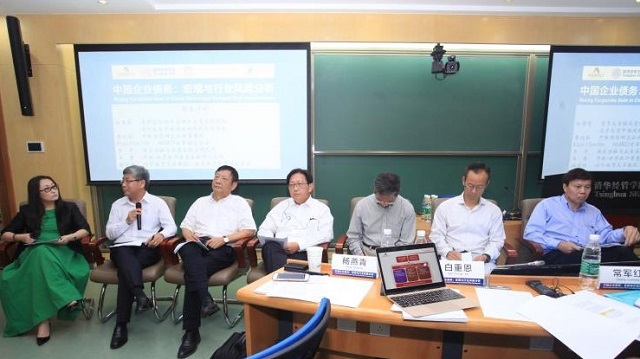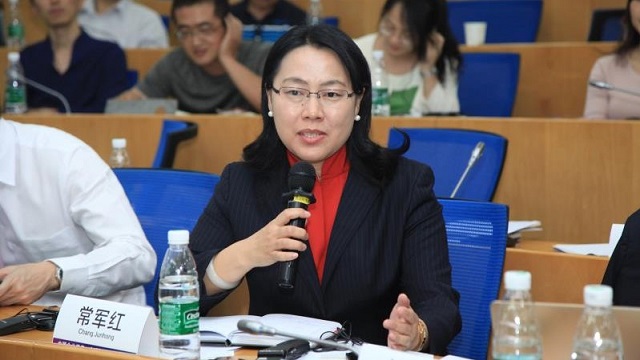
Renowned experts discussed issues pertaining to corporate debt in China at a seminar on August 28, 2017 in Beijing
BEIJING, CHINA, August 28, 2017 – In the short- and medium-term, a crisis originating from corporate indebtedness is unlikely to happen but concerted efforts are warranted to mitigate sectoral and financial stability risks, highlighted by distinguished panelists at a seminar held today in Beijing. The seminar was co-hosted by the ASEAN+3 Macroeconomic Research Office (AMRO), Tsinghua University School of Economics and Management, National Institute for Fiscal Studies of Tsinghua University, and Yicai Research Institute.
“High and rising corporate debt is an important issue for the economic development of China. Recognizing that aggregated data analysis is not sufficient to identify the problems, AMRO has undertaken a comprehensive study to examine the issue from a sectoral perspective based on financial soundness indicators,” said AMRO Director Dr Junhong Chang in her opening remarks. “We hope the discussion today as well as our recent study will contribute to a better understanding of the risk posed by the high corporate debt and the policy measures needed to mitigate the risk.”

AMRO Director Dr Junhong Chang delivers opening remarks at the seminar on corporate debt in China on August 28, 2017 in Beijing.
According to AMRO’s recent study titled “Rising Corporate Debt in China: Macro and Sectoral Risk Assessments,” the ratio of corporate debt to GDP in China is estimated at 155 percent in 2016. In his presentation, Dr Chaipat Poonpatpibul, AMRO Lead Economist, highlighted that corporate debt is concentrated in sectors prioritized under the investment-led growth strategy, such as utilities, transport, real estate and construction. However, financial indicators reveal that major vulnerabilities have emerged mainly within the mining and real estate sectors as well as amongst some manufacturing State Owned Enterprises (SOEs), particularly steel and coal companies with overcapacity.
The main drivers behind the rapid increase in corporate debt are structural and institutional factors linked to China’s stage of economic and financial development, country-specific characteristics, as well as cyclical factors related to the stimulus package during the Global Financial Crisis (GFC).
Bank loans are the main source of financing for corporates but bonds and shadow banking loans have become an increasing source of financing in recent years.
Structural reforms to increase investment efficiency, especially for SOEs, are crucial for constraining the rapid growth in corporate debt. Market-based debt-equity swap is an important way to reduce corporate debt. Strengthening the buffers of financial institutions with high exposure to the vulnerable sectors can help mitigate risks. Deepening the stock markets will encourage corporates to use equity financing and reduce their reliance on debt financing in the medium term.
Further improvements to corporate and financial sector data are crucial for more comprehensive and effective risk assessment and monitoring, AMRO recommended.
The presentation was followed by a panel discussion by policy makers as well as leading scholars and financial sector experts. Moderated by Yang Yanqing, Deputy Editor-in-Chief of Yicai Daily, the panel consisted of Dr Hoe Ee Khor, AMRO Chief Economist; Professor Bai Chong’en of Tsinghua University; Wen Xinxiang, Secretary General of Monetary Policy Committee of the People’s Bank of China; Luo Ping, Research Fellow of National Institution of Finance & Development; Wang Jun, Director of China Europe – World Bank Financial Inclusion System; Cao Yuanzheng, Bank of China International Research, Chairman.
The discussants pointed out that the high and rising corporate debt is an important issue for the economic development of China. Policy priorities are to rein-in the fast rise in leverage, and to address associated financial vulnerabilities. Discussants commended AMRO for providing a comprehensive analysis on this timely and complex issue. In particular, the assessment that vulnerabilities are concentrated in certain sectors and enterprises, has an important policy implication that efforts to curb rising corporate debt, push forward the deleveraging process and mitigate risks, should be targeted to firms in those sectors.
The seminar is part of the ongoing Annual Consultation Visit that AMRO conducts on a yearly basis with its members. The discussion today will provide inputs for AMRO’s assessment report on Chinese economic developments and outlook, which will be prepared after the visit.
